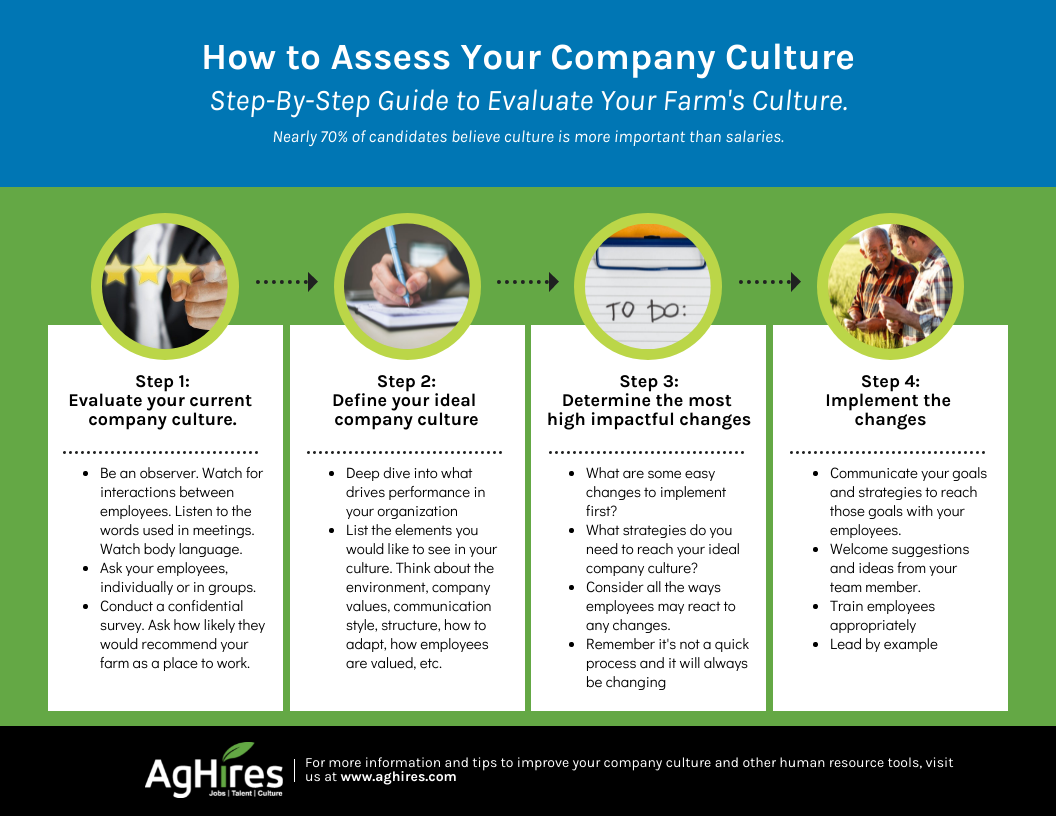
And How to Give Your Agribusiness' Culture an Overhaul
When it comes to company culture there is no “one size fits all” approach. While the lack of concrete definition means that it can be kneaded into what is best for your company, this also means that the concept can feel hazy and intangible and your company culture can end up neglected.
At its core, “culture” is about your company’s values and how they manifest themselves in the workplace, in everything from your policies to employee interactions. It is the context for all that you do. Culture is dynamic and fluid, and made up of every person and quality of your workplace. In agriculture, this might look like the level of attention spent on work quality or relationships between management and staff.
While sometimes you can get lucky and some things just fall into place, you need to make a conscious effort to foster the kind of company culture that is best for you and your employees. There is a lot to be gained from tactfully kneading this culture into your vision, and on the flip side, some serious consequences to consider when you let it fall to the wayside.
A company culture that reflects your core values and benefits both you and your employees will in turn benefit your company in terms of cohesion, efficiency, and increased productivity. In contrast, an ill-fitting culture leads to disengagement among staff, higher turnover, reduced productivity, and subsequent higher costs to your company.
Just because you’re aware of the pros and cons of consciously curating your company’s culture doesn’t mean it's easy. Because culture is intangible and so difficult to define, sometimes it’s hard for both you and your employees to find the right words to have productive conversations about how to go about curating it.
In this guide we’ll discuss points you can reflect on regarding workplace culture to inspire you to make actionable changes and create a culture in which you and your company thrive.
The Power of Leadership
As a manager, you are presented with the opportunity to guide your agribusiness’s culture in a way that benefits everyone, with effects that radiate from the inside out - from employee morale, all the way to happy customers.
You are in a position to set the tone and lead by example. Your employees are looking up to you for what is acceptable and what is not - don’t be intimidated by this, but rather look at it as an opportunity! You have the power to influence culture on both micro and macro levels, from general attitudes and interactions with your employees to company-wide policies.
Your job as a leader is to set expectations and give your employees the tools to empower them to do their jobs. Build trust among your employees by being transparent and encouraging two-way communication. This will strengthen relationships, as well as prevent confusion and cynicism from poor top-down communication.
What kind of agriculture manager are you? Are you one that leads by example? Read our blog What’s Your Management Style? to learn more.
8 Tips to Improve the Company Culture at Your Agribusiness
Now that you’re ready to make some positive change...
What can you do?
As an agriculture executive recruiting firm, we work closely with various types of agribusinesses – both large and small – and have gathered the following tips over the years! Follow these general guidelines to build your company culture and set yourself up for success.
1. Reflect on Your Values
What do you stand for?
Think about your core mission, and how your values fit into the picture. Take a step back and analyze your company from an objective standpoint. Your company culture is alive in every individual and every action that takes place.
Are you driven by results and hard numbers? How do you value safety? How important is respect, and does it go both ways? Do you value collaboration or is work more individual? How important is quality?
Additionally, think about your ideal workplace you would want to work in, as well as why. Now contrast this with the workplace you manage.
Once you have identified your ideal company culture, it’s time to create an intentional strategy that brings out your values. Enhance the traits of your current reality that support the good of the organization, and modify the traits that hinder growth and bring you down.
2. Hire the Right People
When you hire the right person for the right job, everyone wins.
This employee will be more productive, fit in and contribute to the company’s culture, and your business will flourish. On the other hand, if you rush to fill a position and the hire is not a good fit, you will see decreased productivity, higher costs to your company, and poor morale. This poor morale is contagious and will start to affect your business’s culture.
Although in many agriculture jobs it can sometimes feel like your recruiting options are limited with the tight labor market, taking the time to properly vet your hires now can save you time and resources related to decreased productivity and turnover costs in the long run.
In the interview, ask questions related to core values and culture without actually revealing your values and culture. This approach will give you more candid, genuine answers instead of your candidate just telling you what they think you want to hear.
Ask questions that encourage your applicant to talk about their beliefs and experiences, as well as working styles.
Remember that the interview goes both ways - just as you are interviewing your applicant, they are interviewing you to get a feel for fit. Make sure you are accurately representing your business. If your new hire feels they were misled once they start the job, you run the risk of all of the same consequences as hiring someone that’s not a good fit, in addition to souring morale because they feel deceived.
Helpful tip: Work with agriculture recruiters to save yourself a great deal of time, energy, and the risk of hiring the wrong candidate!
3. Give Feedback
If someone is doing a good job, tell them!
Oftentimes, even if someone is doing well, they won’t know they’re meeting your expectations (or even better, exceeding them) unless you actually tell them. Don’t let employees second guess their performance, and don’t assume they know they did a good job.
Consider regular candid feedback in addition to your established performance reviews.
When you celebrate small wins and successes, you boost confidence, overall morale, and foster a positive culture where people feel noticed and appreciated. Not only that, but you’ll motivate your employees to keep reaching for those successes. People who feel recognized are also less likely to quit their jobs, leading to reduced turnover rates.
This feedback applies to mistakes as well. Address mistakes, but avoid creating a culture in which people are afraid of making mistakes and avoid risks. Instead, offer timely, fair, and specific feedback balanced with some positive feedback. Keep it objective and constructive so the employee knows how to improve in the future and does not feel it was personal.
Although giving negative feedback is never fun, it’s important to be fair and hold people accountable for their mistakes so that higher achievers don’t feel unmotivated and unnoticed.
4. Be Transparent
When you keep employees in the loop, you show that you value their involvement and it builds trust from the bottom-up. Reliable communications are key in maintaining this trust - even if small seeds of doubt about your reliability are planted, they can spread and create general feelings of distrust and cynicism. This will in turn affect not only overall morale but work performance.
Openly celebrate company and individual success, no matter how small it is! Additionally, acknowledge your business’s shortcomings and share challenges to help build a sense of community. Everything your business is going through, go through it together. When management is transparent about their struggles, it shows employees that it is OK and that they’re encouraged to do the same.
5. Find What Motivates Your Employees
People have an inherent desire for meaning. When people feel a sense of purpose in their work, they are more engaged, motivated, and experience a sense of fulfillment not just in work but in life.
The reality is that you can find meaning in any work, but sometimes it is up to you to connect the dots for your employees. Show them the real-life effects of how they fit into the big picture, beyond just the task at hand. Help your employees find positive meaning and recognize the impact they have on others, in the workplace and beyond.
Consider rewards programs for those who personify your company values. This helps draw attention to the kinds of behaviors that are important to you and your company and motivates your employees to model that behavior, in turn reinforcing your culture.
6. Know that You’re a Family
At the end of the day, all of the unique individuals and complex moving parts within your organization are functioning as a single unit. Create an agribusiness culture and environment that fosters strong relationships between employees and between employees and management, founded in shared values.
When these relationships are strong, people will feel an increased responsibility to look out for one another and care for each other, and everyone is stronger because of it. This family will be able to withstand hard times better when everyone feels like they have each other’s backs.
7. Measure Your Success
How do you know if what you’re doing is working? How can you quantify and track the success of something intangible, like company culture?
Develop a cultural assessment instrument that employees can use to grade your organization on key aspects of your company’s culture. Get input from people at all levels of your organization, and communicate the results.
Focus groups are a great way to get first-hand feedback directly from your employees to hear what is working and what is not. A consensus on values between employees and management will be strong and more pervasive than values that are only held by management.
8. Prioritize Mental Health
Your employees are not just cogs in your machine, they are humans first. Embody this sentiment by prioritizing mental health and making room for work-life balance in your organization.
Although it might feel impossible to allow for work-life balance in agriculture, neglecting to do so is not only counterproductive to your business but harmful for your employees. Analyze your current policies to see where changes can be made to accommodate work-life balance so that you can avoid dreaded burnout, and be aware of local resources available to those who need them.
When employees feel like they are valued as human beings, they’re actually more productive and your business fares better. Create an environment where your employees are comfortable coming to you with their struggles. This culture of care will strengthen trust in management, and in turn, strengthen your business.

Concluding Thoughts
When you create an intentional strategy to curate your agribusiness’s culture instead of leaving it up to chance, you set yourself up for success. Small, actionable changes such as modeling respect and transparency from the top-down help create an environment people genuinely want to work in!
Whether you are already happy with your company’s culture or need a total overhaul and don’t know where to start, continuous improvement is the goal. Regularly reevaluate your business and make the conscious effort to make small changes, and be amazed at what you accomplish!
Looking for high-level candidates to play an important role at your company? AgHires is an industry-leading ag recruitment agency with an extensive network to help you with your agribusiness executive search! Sign up to get started today.






